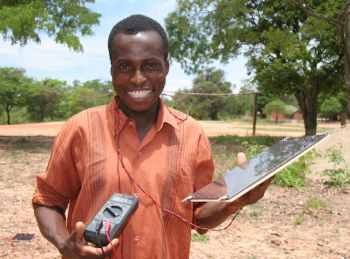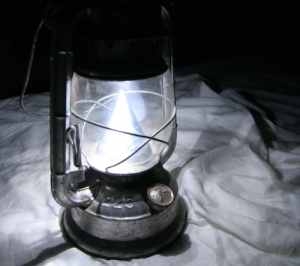
The Power of the Sun: Solar
Lanterns Transform Lives in Malawi, Africa
 |
| Photo Credit: Any Bodycombe/SolarAid |
May 7, 2008 - Nick Sireau, SolarAid Director - renewableenergyworld.com
Mirriam is 18 years old and lives in Malawi.
She has two children, one brother and one sister.
Her father died of AIDS and her mother is now
also sick with HIV AIDS. Every day is a struggle:
finding food for her children, caring for her
mother, looking after her other sick relatives
– all this with next to no income.
Yet she's now found hope in a ground-breaking
project carried out by non-profit SolarAid with
funding another non-profit, TRAID. SolarAid
is training young Malawians to become solar
entrepreneurs so that they can build and sell
small solar products such as solar lanterns
and solar chargers for mobile phones and radios.
The project is aiming particularly at young
people affected by HIV/AIDS in order to provide
them with more income.
The average African household uses 55 or so
liters of kerosene per year, at an approximate
cost of £80 [US $158]. This contributes to health
problems as the burning of kerosene inside houses
is a major cause of respiratory illness, fires,
burns, accidental poisonings, eyesight problems
and death in the developing world. Kerosene
is far more expensive and far less efficient
than electric lighting: the cost of useful light
energy ($/lumen hour of light) for kerosene
is 325 times higher than the inefficient incandescent
bulb and 1,625 times higher than compact fluorescent
light bulbs.
In rural areas, the high cost of kerosene can
consume much of a family's income. One lamp
consumes 0.07 liters per hour with daily usage
of around two hours burn time, amounting to
around 4 liters per month. In the developing
world, a family's lighting costs, because of
kerosene fuel costs, are equal to those of a
family in the developed world. Even with government
subsidies, kerosene requires 10% to 25% of a
villager's annual income.
The training that SolarAid is doing involves
teaching your Malawians to convert a standard,
medium sized kerosene "hurricane" lanterns (not
pressurized or "tilly" lanterns) into LED solar
lanterns. Conversion of the lanterns involves
putting rechargeable AA batteries into the chimney
and using 3.3V, 25mA LEDs (wired in parallel)
to direct light down onto an improvised cone
reflector, which sits over the top of the old
wick. The reflector is constructed from locally
collected materials such as aluminium foil,
gift wrap, or the inside of a cigarette packet,
and is configured in a conical shape to provide
uniform reflection.
The torches are guaranteed for three years.
Batteries are designed to be recharged up to
1000 times without "memory effect." SolarAid
tests have shown a solar LED lantern can go
for up to 10 days non-stop on a single battery
charge, meaning the batteries could last 20
years or more if only used once a week. The
batteries are recharged with one-watt solar
panels, which are made locally with imported
amorphous silicon and wooden frames. The PV
panels do not degrade over time and are sold
in the West with at least a 10-year warranty.
All other components can be replaced when needed
as they are sourced locally.
 |
| LED Solar Lantern Image
Credit: Andy Bodycombe/ SolarAid
|
SolarAid is working with a number of local
organizations in Mzuzu, in the north of Malawi.
These partners include the Center for Appropriate
Technology, which specializes in alternative
approaches to technology for development, the
St John of God Vocational Training Center, which
has an excellent carpentry workshop for building
wooden frames for the solar panels, and the
Mzuzu Technical College, which will train solar
entrepreneurs in sales and marketing. Charles
is one of the microsolar staff at the Center
for Appropriate Technology. "It's great working
on these solar panels," he says. "They're easy
to build and they can provide power to villages
with no electricity."
Barely 2 percent of the rural population in
Malawi has access to electricity. The other
98 percent relies on expensive kerosene for
lighting, single-use batteries for radios and
the occasional charging of their mobile phones
— amounting to 20 percent of their monthly income.
One microsolar panel can answer all these needs,
leading to major energy savings for rural households.
There's also a climate change angle. According
to market research carried out by SolarAid in
Malawi with TRAID funding, the average kerosene
lamp creates around a ton of carbon over 10-14
years. There are probably around 1 -1.5 million
kerosene lamps in Malawi, so replacing them
with solar lanterns will lead to significant
reductions in carbon emissions.
Dave and Carl are two volunteers working on
this microsolar project. Just a few days ago
they organized a meeting with all the key players
in Mzuzu who are interested in being involved
in microsolar. The feedback about their first
visits to villages to demonstrate the panels
was overwhelming: the villagers are really interested
in buying the panels and lanterns as they can
all see the energy savings, the health benefits
and the educational benefits from having them.
Maxon Chitawo, from Mzuzu University's Department
of Energy, is a specialist in renewable energy.
He said that he thought the microsolar concept
would soon take off across Mzuzu and the surrounding
areas, so great is the need for safe and affordable
energy.
Fiskani is SolarAid's local project coordinator.
He's come up with a potential name for the microsolar
panel: Mphamvu Ya Dzuma, which, in Chichewa,
means "Power of the Sun" — a fitting name for
a pioneering new concept.
Nick Sireau is the Director of SolarAid,
a non-profit organization that has set out to
enable the world's poorest people to have clean,
renewable power. Solar power leads to better
education, health, safety and income by allowing
poor communities to cook, pump water, run fridges,
store vaccines, light homes, schools, clinics
and businesses, and power computers, homes and
farms more effectively. SolarAid is carrying
out a large microsolar program in the northern
region of Malawi. To learn more about SolarAid
or to make a donation in support of one or all
of these projects, visit the website at www.solar-aid.org.

|